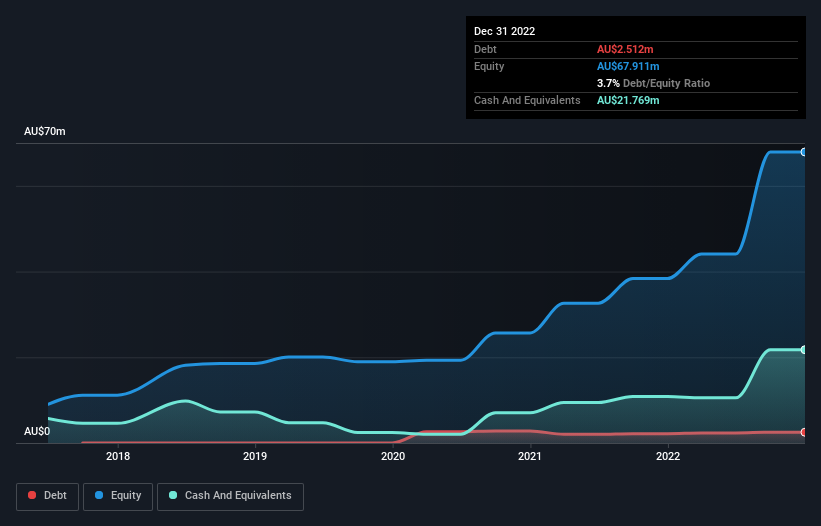Legendary fund manager Li Lu (who Charlie Munger backed) once said, 'The biggest investment risk is not the volatility of prices, but whether you will suffer a permanent loss of capital.' So it might be obvious that you need to consider debt, when you think about how risky any given stock is, because too much debt can sink a company. Importantly, Cobalt Blue Holdings Limited (ASX:COB) does carry debt. But is this debt a concern to shareholders?
Why Does Debt Bring Risk?
Debt is a tool to help businesses grow, but if a business is incapable of paying off its lenders, then it exists at their mercy. In the worst case scenario, a company can go bankrupt if it cannot pay its creditors. While that is not too common, we often do see indebted companies permanently diluting shareholders because lenders force them to raise capital at a distressed price. Of course, debt can be an important tool in businesses, particularly capital heavy businesses. When we think about a company's use of debt, we first look at cash and debt together.
Check out our latest analysis for Cobalt Blue Holdings
How Much Debt Does Cobalt Blue Holdings Carry?
The image below, which you can click on for greater detail, shows that at December 2022 Cobalt Blue Holdings had debt of AU$2.51m, up from AU$2.18m in one year. However, it does have AU$21.8m in cash offsetting this, leading to net cash of AU$19.3m.

How Strong Is Cobalt Blue Holdings' Balance Sheet?
The latest balance sheet data shows that Cobalt Blue Holdings had liabilities of AU$4.80m due within a year, and liabilities of AU$3.04m falling due after that. Offsetting these obligations, it had cash of AU$21.8m as well as receivables valued at AU$105.0k due within 12 months. So it can boast AU$14.0m more liquid assets than total liabilities.
This surplus suggests that Cobalt Blue Holdings has a conservative balance sheet, and could probably eliminate its debt without much difficulty. Simply put, the fact that Cobalt Blue Holdings has more cash than debt is arguably a good indication that it can manage its debt safely. The balance sheet is clearly the area to focus on when you are analysing debt. But it is Cobalt Blue Holdings's earnings that will influence how the balance sheet holds up in the future. So when considering debt, it's definitely worth looking at the earnings trend. Click here for an interactive snapshot.
Given its lack of meaningful operating revenue, investors are probably hoping that Cobalt Blue Holdings finds some valuable resources, before it runs out of money.
So How Risky Is Cobalt Blue Holdings?
By their very nature companies that are losing money are more risky than those with a long history of profitability. And in the last year Cobalt Blue Holdings had an earnings before interest and tax (EBIT) loss, truth be told. And over the same period it saw negative free cash outflow of AU$25m and booked a AU$6.3m accounting loss. With only AU$19.3m on the balance sheet, it would appear that its going to need to raise capital again soon. Overall, its balance sheet doesn't seem overly risky, at the moment, but we're always cautious until we see the positive free cash flow. The balance sheet is clearly the area to focus on when you are analysing debt. But ultimately, every company can contain risks that exist outside of the balance sheet. Case in point: We've spotted 5 warning signs for Cobalt Blue Holdings you should be aware of, and 3 of them are a bit unpleasant.
If, after all that, you're more interested in a fast growing company with a rock-solid balance sheet, then check out our list of net cash growth stocks without delay.
New: AI Stock Screener & Alerts
Our new AI Stock Screener scans the market every day to uncover opportunities.
• Dividend Powerhouses (3%+ Yield)
• Undervalued Small Caps with Insider Buying
• High growth Tech and AI Companies
Or build your own from over 50 metrics.
Have feedback on this article? Concerned about the content? Get in touch with us directly. Alternatively, email editorial-team (at) simplywallst.com.
This article by Simply Wall St is general in nature. We provide commentary based on historical data and analyst forecasts only using an unbiased methodology and our articles are not intended to be financial advice. It does not constitute a recommendation to buy or sell any stock, and does not take account of your objectives, or your financial situation. We aim to bring you long-term focused analysis driven by fundamental data. Note that our analysis may not factor in the latest price-sensitive company announcements or qualitative material. Simply Wall St has no position in any stocks mentioned.
About ASX:COB
Cobalt Blue Holdings
Engages in the exploration and evaluation of mining properties in Australia.
Medium-low risk with excellent balance sheet.
Market Insights
Community Narratives



